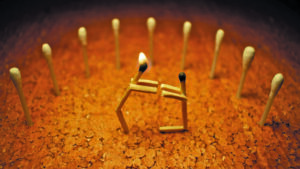 Spring is already in the air and the festival of spring (Jamshedi Navroze) is once again here to remind us of warmth and change – warmth of heart and positive change in our lives. In the poem, ‘The Spring’, poet Thomas Carew contrasts the beauty and joy of spring with the pain of unreciprocated love. The poet describes the transformation of the world in Spring: a time when the earth softens and comes vibrantly alive. At the same time, the poet bemoans the fact that the changing season does nothing to warm the icy heart of the woman he loves. Her heart, the poet laments, is the one thing that doesn’t follow nature’s rhythms. Is this also the case with our community? Can we say the changing season does nothing to warm the icy heart of the community that selfishly hankers mostly after merriment or the heart of the community does not follow Nature’s rhythms?
Spring is already in the air and the festival of spring (Jamshedi Navroze) is once again here to remind us of warmth and change – warmth of heart and positive change in our lives. In the poem, ‘The Spring’, poet Thomas Carew contrasts the beauty and joy of spring with the pain of unreciprocated love. The poet describes the transformation of the world in Spring: a time when the earth softens and comes vibrantly alive. At the same time, the poet bemoans the fact that the changing season does nothing to warm the icy heart of the woman he loves. Her heart, the poet laments, is the one thing that doesn’t follow nature’s rhythms. Is this also the case with our community? Can we say the changing season does nothing to warm the icy heart of the community that selfishly hankers mostly after merriment or the heart of the community does not follow Nature’s rhythms?
Will Jamshedi Navroze simply mean decorating the Navroze table without understanding its significance and greedily enjoying community feasts without gratitude? Will this Navroze signify just Cheerfulness or also positive Change in our thinking and our actions? Will this Navroze be about, ‘if we can’t fight them, lets join them’? Will this Navroze be about standing up and speaking out against Wrongs or about diplomatically sitting together to feast and be politically Right? Will this Navroze be about Pretence and Popularity or Piety and Philanthropy? The choice is clearly ours.
Divine Wisdom
The legendary Shah Jamshed (Jamsheed) was devout and committed to progress and prosperity. However, was it Divine Power and Wisdom that aided this glorious king in attaining success in the welfare and developmental works that he undertook, or was it the welfare and developmental works that he undertook that aided him in attaining Divine Power and Wisdom? This is an important truth and lesson for our community. Does power aid progress and prosperity or does progress and prosperity aid in the attainment of power?
Ancient Zoroastrian texts refer to khvarenah (in Avesta) or Farr (in Pahlavi or middle Persian). We commonly know it today as Khoreh or Divine Glory. Like the Fravashi (our immaculate Guardian Spirit), Khoreh is also a spiritual companion of the soul. Both work in concert in the person who thinks, speaks and acts with Ashoi (truth, purity and righteousness). The scriptures assert that khvarenah is Mazda-datem or ‘lawfully given by the divine’ to righteous leaders, from the time of Shah Hushang and Shah Jamsheed of the pre-historic Peshdad (Pesh = first and Dad = Law i.e., first law givers) dynasty. However khvarenah flies away when a righteous leader turns corrupt.
According to Zamyad Yasht (19.34-35): “When he (King Jamsheed) began to find delight in words of falsehood and untruth, the (Kava or Kayan) khvarenah was seen to flee away from him in the shape of a Vareghna bird towards the sun and the great monarch (spiritual and temporal leader) lost his divine right to rule as a leader.
Zamyad Yasht asserts that kingship and the mantle of leadership of the Aryan people must first be deserved. Khvarenah is Mazda-datem or God-given (also interpreted as wisdom given) to righteous leaders only. It flies away when an Ashwan (pure, truthful and righteous person) gets corrupted by pride, dishonesty or other vices. In other words, leadership must be exercised wisely. When arrogance and untruth take over, wisdom flees, marking the beginning of the downfall of the leader, as we see in the life of Shah Jamshed.
Arrogance Leads To Doom
According to the Shah Nameh (the Book of Kings), when Shah Jamsheed virtually ushered Frashokereti (making this world wonderful, excellent and near perfect), he proclaimed in his court: “I think that there is no one in this world like me. I am unique. I have bettered this world and alleviated all pain and suffering. Skills and trades are flourishing in this world because of me. Life and awareness of life of my subjects is thanks to me. It’s by my grace that my people have good clothes to wear and good food to eat. I should be recognized by my people as their God.” The Shah Nameh states that as soon as he uttered these conceited and egoistic words, his Khoreh left him in the form of a bird. Shah Jamsheed lost his Divine Power and all other worldly powers.
Not only did Jamsheed’s subjects forsake him, they went in search of a new leader and found Zohak. It is a classic case of arrogance leading to doom and ego extinguishing all the good achieved. The story of Shah Jamsheed helps us understand that power is necessary for progress and prosperity. But power must be attained through the right use of knowledge and application of wisdom with humility. Pride, to an extent, is legitimate and positive. But arrogance is undesirable and negative. As long as Shah Jamsheed focused his attention on his people and stayed humble and grateful to Divinity, there was glory for him, his people and the world. The moment his attention moved from Ahura Mazda’s will and his people, to his own self, where he began thinking he was all powerful, his fate was sealed. His Khoreh or divine power and wisdom left him and with that, he lost all power and position.
Power For Good
Power is a double-edged sword. It can be used positively or negatively. Abraham Lincoln said, “If you want to test a man’s character, give him power.” Any leadership mentor would tell you that power is more readily lost when leaders prioritize self-interest over collective goals. One of the keys to maintaining power is advancing the interests of all stakeholders, in a fair manner, with humility.
A true leader is always humble and driven with the love to serve others instead of serving his or her self-interest. Being humble as a leader makes one more relatable and approachable, creating a more humanistic environment where people feel comfortable being open and taking responsibility. Instead of ego, a leader should cultivate and display empathy or the ability to understand how others feel.
This Jamshedi Navroze, may we, as a community aspire to give rather than receive, offer gratitude instead of displaying greed… and above all else, lead each other towards peace, progress and prosperity with wisdom!
- Celebrate Nature’s New Year With Purity And Piety of Ava - 22 March2025
- Celebrate Navruz 2025 With The Spirit Of Excellence And Wholesomeness - 15 March2025
- Celebrating Women And Equality - 8 March2025
